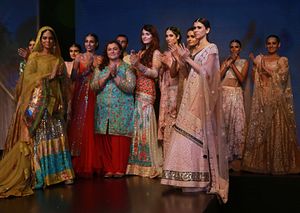There’s a saying that where politicians fail, the people succeed. This might be true in the subcontinent.
While the governments of India and Pakistan are discovering reason after reason to not engage with each other, civil society groups on both sides of the border are loathe to miss even a single opportunity to interact with each other.
Once such initiative is Shaan-e-Pakistan: a three-day event in New Delhi showcasing the food, fashion, and music of Pakistan. Coming on the heels of renewed tensions between the two neighbours, the event tried to seize on a sense of normalcy between New Delhi and Islamabad.
Despite this, tensions hung heavy on the first day of the event, which was held at the Pakistani embassy in New Delhi. The venue could not manage to get the main attraction of the evening, a classical singer, Amjad Sabri, from Pakistan to arrive on time. He was detained at Delhi’s international airport for four hours over a security check. The delay dampened spirits at the event of those who had come out to hear him. The episode demonstrates just how deep paranoia about Pakistanis runs in the security apparatus in both countries. Eventually, the singer showed up five hours behind schedule. Still, there was sizable crowd to cheer him on in the middle of the night.
Inaugurating the event, Pakistan’s envoy in Delhi, Abdul Basit, said that “it’s a brilliant initiative and a great idea to bring food and fashion together to showcase to India.” He talked of settling disputes between the two neighbours and ushering in a new era of peace and security.
However, all eyes were focused on Huma Nassr, the curator of Shaan-e-Pakistan, who had worked tirelessly to make the event a reality in India. Nassr is one of the first fashion designers from Pakistan to open shop in India.
“We hope that Pakistan and India settle their disputes and start a new era of peace and prosperity,” said Nassr, who almost lost hope for the event after the recent political tensions between the two nations. She, however, says that “one needs to be positive and work in bringing people together so that both sides see each other’s talents.”
Indeed, her artistic and designing talents were on full display in Delhi that evening. Additionally, designers from across the border displayed their products and talents, to the delight of many Delhites who were seeing these Pakistani products for the first time.
In the eyes of many Indians, Pakistan is considered to be nothing more than a den for Islamic fundamentalism and extremism. This event was a chance to change that.
“It’s a real eye opener for me to see the range of products from Pakistan. They are amazing. A few hours visiting the Pakistani stalls have demolished many of my prejudices and false notions about Pakistan. There are other facets of our neighbor which the Indian media doesn’t expose us to,” Reena Pande, a software engineer, told The Diplomat.
Many Pakistani visitors were surprised to witness this ignorance about their country.
“We know so much about India, from Bollywood to the fashion industry, but people out here don’t believe that we exist in Pakistan,” says a leading fashion designer from across the border. She was also bitter about the attitudes of the security forces at the Wagah border, the sole land transit point between India and Pakistan in Punjab.
“Despite our having a proper innovation from Delhi, we were made to wait a long time and fill up many long forms,” she says. “We were also not allowed to bring all the products we wanted to. They charged us 200,000 rupees as tax. How can we sell our products if you tax us so high?”
Umar Sayeed, a well-known name in Pakistan’s fashion industry, rues that “at a time when the world is integrating, India and Pakistan are growing apart every day.”
The event came to a glittering end on Saturday night with a gala fashion show, where both Indian and Pakistani designers showcased their latest collections, displayed on models from both countries. The predominantly Indian audience cheered each and every Pakistani presentation.
The event was a testament to another old saying: art unites while politics divides.

































